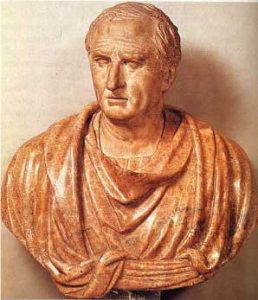
Cicero, a Roman philosopher
The Stoics were a group of philosophers who first began teaching their ideas in the Hellenistic period. Stoicism was founded by a man named Zeno, who lived from 335-263 BC. He was friendly with the successors of Alexander who ruled Greece. Zeno lived in Athens, which was a great center of learning. He used to lecture not in a classroom but outside (in Greece’s sunny weather), on the porch of a public building. The word for porch in Greek is STOA, and so people called his students Stoics, “people who hang out on the porch.”
Zeno thought people should try to reach inner peacefulness. The best way to be peaceful was to be moderate in everything. So people should not eat too much, even of good food, and they should not party too much. But they should not work all the time either, or diet all the time. Men (Zeno didn’t mention women much, but there were Greek women who were Stoics) should give to charity and help out in the government, but they should not go to the extreme of rebellion. People should try not to want anything too much, but be happy with what they had. This would lead to a happy life.
You might compare Stoicism to the slightly earlier philosophy of Buddhism in India, which was also about inner peace, or to Confucianism and Taoism in China, which had some similar ideas about balance and moderation.
Stoicism was very popular among the Romans, who generally liked moderate behavior anyway. Two famous Roman Stoics were Cicero and Seneca.




